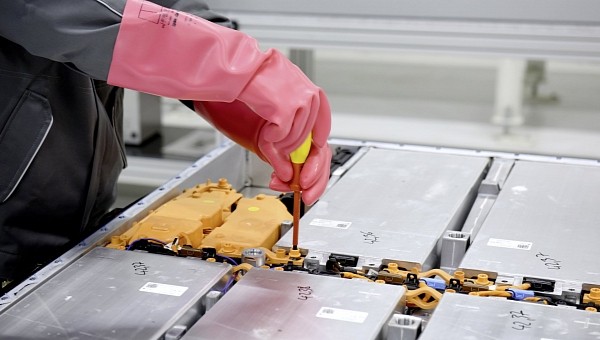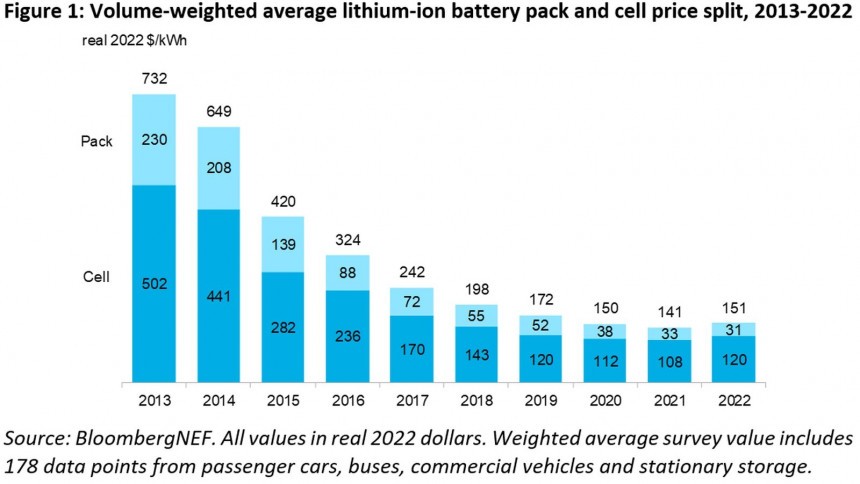For years, carmakers have indicated that lowering battery costs is key to achieving EV price parity with combustion-engine vehicles. After the costs have constantly decreased year after year, in 2022, the Li-Ion battery packs have become more expensive for the first time, shattering the dream of affordable EVs.
Although more popular than ever, electric vehicles remain expensive for most people. For years, carmakers have promised to bring affordable EVs to the market, but this dream has only moved further away in the past year. We were so used to seeing battery prices falling year after year that many predicted 2024 as the year when battery-electric vehicles would become as affordable as their ICE counterparts.
Indeed, battery packs used to cost as much as $1,000 per kWh in 2010, and prices have fallen exponentially to just $141 in 2021. The world was still on target to achieve price parity in 2025, despite the disruptions caused by the pandemic. Unfortunately, Europe was hit with a war in 2022, and China chose to overreact to recent Covid outbreaks, causing further harm to the world economy. After many years of constantly-falling battery prices, 2022 has brought us the first increase.
A BloombergNEF (BNEF) study shows that Li-ion battery pack prices have increased by 7% to $151/kWh in 2022. Even though less expensive chemistries, like lithium-iron-phosphate (LFP), have gained traction, the upward cost pressure still prevailed. Carmakers repeatedly stated that $100/kWh battery packs would bring EV prices to the same level as ICE vehicles. Nevertheless, BNEF expects battery packs to remain equally expensive throughout 2023, pushing the dream of affordable electric cars further away.
If prices for key battery metals like lithium, nickel, and cobalt keep the current trends, BloombergNEF predicts that battery costs could start dropping again in 2024. This should be helped by more lithium extraction and refining capacity coming online in the next two years. If everything goes as BNEF predicts, the industry will still build battery packs at the price-parity level of $100/kWh in 2026, two years later than previously expected.
Nevertheless, the demand for Li-Ion battery packs is surging, despite rising prices, reaching 603 GWh in 2022. This is almost double the 2021 levels, according to BNEF. At the same time, lithium remains expensive due to persistent supply chain constraints and the slow ramp-up in new production capacity. Given the circumstances, the industry needs new technologies like solid-state electrolytes, cathode materials, and manufacturing processes to play a more important role in lowering prices.
Indeed, battery packs used to cost as much as $1,000 per kWh in 2010, and prices have fallen exponentially to just $141 in 2021. The world was still on target to achieve price parity in 2025, despite the disruptions caused by the pandemic. Unfortunately, Europe was hit with a war in 2022, and China chose to overreact to recent Covid outbreaks, causing further harm to the world economy. After many years of constantly-falling battery prices, 2022 has brought us the first increase.
A BloombergNEF (BNEF) study shows that Li-ion battery pack prices have increased by 7% to $151/kWh in 2022. Even though less expensive chemistries, like lithium-iron-phosphate (LFP), have gained traction, the upward cost pressure still prevailed. Carmakers repeatedly stated that $100/kWh battery packs would bring EV prices to the same level as ICE vehicles. Nevertheless, BNEF expects battery packs to remain equally expensive throughout 2023, pushing the dream of affordable electric cars further away.
Nevertheless, the demand for Li-Ion battery packs is surging, despite rising prices, reaching 603 GWh in 2022. This is almost double the 2021 levels, according to BNEF. At the same time, lithium remains expensive due to persistent supply chain constraints and the slow ramp-up in new production capacity. Given the circumstances, the industry needs new technologies like solid-state electrolytes, cathode materials, and manufacturing processes to play a more important role in lowering prices.







